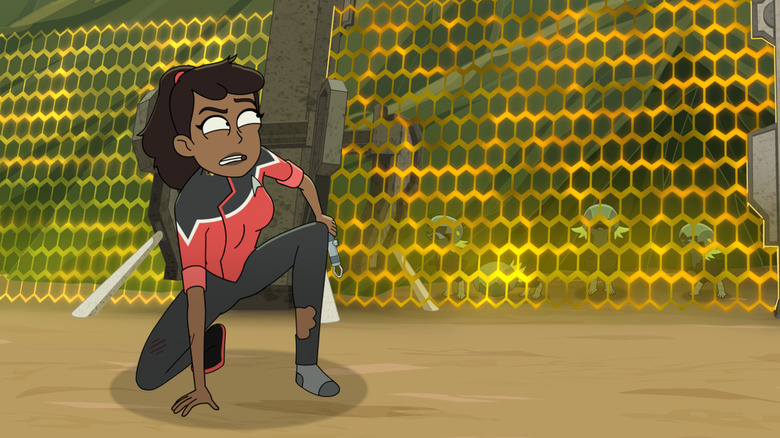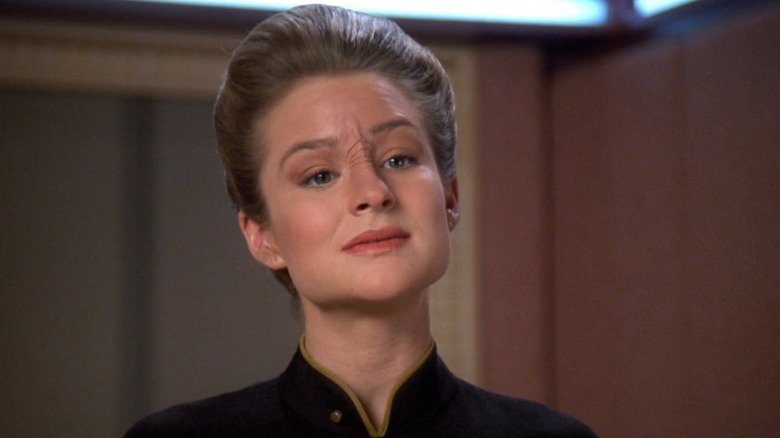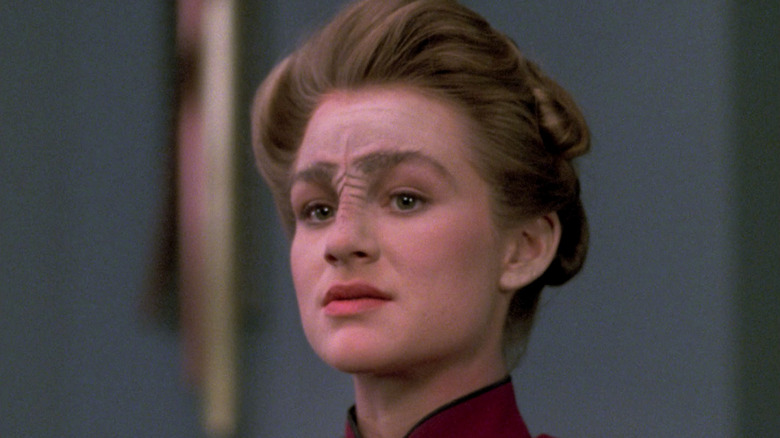Lower Decks Finally Explores Mariner's Backstory – And Her Ties To Star Trek History
This post contains spoilers for the latest episode of "Star Trek: Lower Decks."
In a recent episode of "Star Trek: Lower Decks," the one called "Parth Ferengi's Heart Place," Lieutenant Mariner (Tawny Newsome) was assigned to review resorts on the Ferengi homeworld of Ferenginar. Rather than have a good time and write down hotel amenities, Mariner became determined to drink too much and get into bar brawls. Cantankerous and intoxicated, she threw fists, hurt people, got punched a few times herself, and was thrown into a Ferengi prison. A friend, Quim (Tom Kenny), had to bail her out.
Afterward, Quim asked Mariner why she, of all people, was always so violent and unhappy. Mariner was raised in a Starfleet family and was always taken care of. Why does she feel the need to self-sabotage her life? Mariner was taken aback by the question, unsure as to what the answer was.
In the latest episode of "Lower Decks," called "The Inner Fight," Mariner was finally able to answer that question. Stranded on a distant planet, and questioned by a Klingon warrior, Mariner confesses that her self-destructive behavior stems directly from the fate of an old Starfleet Academy friend named Sito. Mariner explained that she was once eager to become a starship captain, and modeled her behavior after Sito, a stalwart and capable compatriot that she held in incredibly high esteem. Sito's Starfleet career didn't end well, however, and it left Mariner wounded and resentful.
Trekkies will instantly recognize Sito's name. Mariner is talking about Ensign Sito Jaxa (Shannon Fill), a character who appeared in the "Star Trek: The Next Generation" episodes "The First Duty" as well as "Lower Decks," the TNG episode that lent "Star Trek: Lower Decks" its title. As Mariner said, she did not come to a pleasant end.
Ensign Sito Jaxa
In "The First Duty," Sito Jaxa, a young and aspiring Bajoran cadet, became embroiled in a scandal at school. It seems that a hotshot pilot student named Nick Locarno (Robert Duncan McNeill) convinced her and a few other cadets to perform a dangerous and illegal maneuver during flying class that would have looked really impressive and presumably would have impressed the Starfleet professors. The stunt, however, accidentally killed a fellow cadet and Nick convinced Sito, Wesley Crusher (Wil Wheaton), and a few others to cover up the circumstances of the death. Naturally, the students were found out.
Despite the scandal, and despite being held back a year as a result, Sito eventually graduated and was stationed on board the U.S.S. Enterprise-D under Captain Picard (Patrick Stewart). Picard admitted to Sito that he specifically requested her for assignment on the Enterprise, as he wanted to see if she had managed to redeem herself. Would she display any newfound strength of character? These events were dramatized in the episode "Lower Decks." That episode followed not the Enterprise senior staff, but the lower-ranking officers who are specifically excluded from some of the more dramatic life-of-death struggles regularly encountered up on the bridge.
"Lower Decks" revealed that the early part of a Starfleet career involves a series of stressful tests, a constant need to prove yourself, and a lot of following orders without question. All of these were bore out by Sito, who was tested by Worf in combat training, and by Picard, who questioned her integrity to her face. Sito died after she volunteered for a secret spy mission into Cardassian space. After she died, Picard announced that Sito did indeed possess a great deal of strength of character.
It was a heartbreaking moment.
Mariner's fists
Mariner, it has now been revealed, was friends with Sito. After she died, Mariner seemingly found herself despondent. Starfleet prepares cadets to map the galaxy, explore, expand knowledge, and generally serve to make the galaxy a better place. When Mariner learned that good people like Sito die in the line of duty, she became disillusioned by Starfleet idealism. Why become a captain, when it will mean sending stalwart ensigns to their deaths? It was better, Mariner figured, to stay an ensign indefinitely.
Mariner also mentioned that she was present for the Dominion War, a years-long conflict dramatized in detail in the later seasons of "Star Trek: Deep Space Nine." Starfleet, Mariner now saw, was capable of battle, combat, and death. She still loved Starfleet's ideals, but has come to hate and resent authority. Any semblance of being a responsible Starfleet captain now only spells out a fall from grace, a willingness to commit acts of war and subterfuge that only lead to death.
With those thoughts in mind, and thinking about Sito, Mariner has taken to fighting. Mariner uses violence to work out her long-held frustration and anger over losing faith in Starfleet Command but also to be disciplined regularly. If she's insubordinate all the time, then surely she'll never be promoted, never be a captain, and stay an ensign until death, just like Sito.
In tying Mariner's comedically brash behavior to the death of an obscure "Next Generation" character as well as the Dominion War, "The Inner Fight" has done more to interrogate Starfleet wartime malfeasance than any of the shows since "Deep Space Nine." The latest season of "Star Trek: Picard" featured a vengeful survivor from the same war, but didn't depict Starfleet doing any post-war reparations.
Mariner's hard fists are symbols of true justice.


